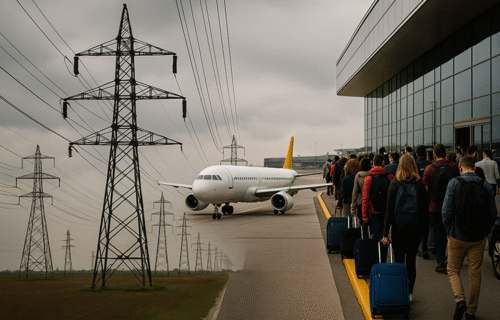Spain’s government entered the weekend facing renewed scrutiny over two very different crises — a fragile electricity network that experts warn could buckle under stress again, and a brewing legal clash with the European Union over its fines against budget airlines.
The national grid operator, Red Eléctrica de España (REE), has raised concerns about irregular voltage patterns across the country’s power system, just months after a massive blackout left millions in Spain and Portugal without electricity. Though REE insists the current fluctuations remain within safe limits, the warning has reignited fears of a repeat of April’s outage, which brought trains, elevators, and communications to a standstill across the Iberian Peninsula.
Independent analysts tracing the April incident found that the failure was not caused by an energy shortage, but by an outdated grid unable to respond quickly enough to sudden surges. As renewable energy sources expand and power systems become more complex, maintaining stability has grown more challenging. The European grid coordination body has since called for updated safety measures and faster digital response tools to prevent similar disruptions, underscoring how critical modernisation has become for interconnected European networks.
In Madrid, the renewed focus on grid reliability has quickly turned political. Opposition parties are pressing the energy ministry for accountability, accusing officials of failing to invest in infrastructure upgrades despite repeated warnings. Government officials maintain that investments are underway and that new control systems will make the grid more resilient, though they stopped short of giving firm deadlines.
While Spain’s energy operators manage that technical storm, another dispute is brewing in Brussels — this time over airline baggage fees. The European Commission has launched legal proceedings after Spanish regulators fined several low-cost airlines, including Ryanair and Vueling, for charging passengers extra to bring standard hand luggage onboard. EU officials argue that the penalties breach European competition rules that allow carriers to set their own pricing models. Spain’s consumer agency insists its measures protect passengers from misleading pricing practices, but the case may now head toward the European Court of Justice if no resolution is found.
The issue has divided public opinion. Travellers frustrated by add-on costs have applauded Madrid’s stance, seeing it as overdue protection against hidden charges. Airlines counter that baggage fees are essential to keeping ticket prices low, warning that stricter national rules could undermine the continent’s single aviation market. Industry experts say the outcome will likely shape how far national governments can go in imposing their own consumer protections within EU frameworks.
Both the energy and airline cases reflect a deeper tension between national control and European integration. On one side, Madrid is under pressure to protect citizens — ensuring reliable power and fair travel costs. On the other, it must operate within shared EU systems that limit unilateral action. For Brussels, the balancing act is equally delicate: maintaining regulatory consistency while acknowledging local realities in a continent of uneven infrastructure and varied consumer expectations.
As autumn brings heavier electricity demand and a surge in travel, Spain finds itself at the intersection of two defining tests — one technological, the other legal. Whether it can keep the lights on and defend its consumer policies without clashing with European regulators may set the tone for how the country navigates the next phase of its relationship with the EU.
